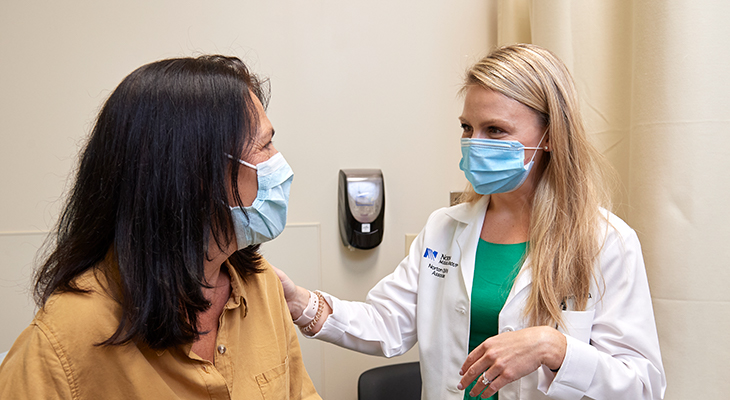The decision whether or not to take hormone therapy (HT) after menopause is not made in a vacuum. Breast cancer risk is influenced by lifetime estrogen exposure and genetic risk factors.

The decision whether or not to take hormone therapy (HT) after menopause is not made in a vacuum. Breast cancer risk is influenced by lifetime estrogen exposure and genetic risk factors. HT is just one part of the equation, along with factors like age of menopause onset, obesity and whether or not the patient breastfed. In the short term, taking estrogen boils down to being the equivalent of not being in menopause for another year.
The Women’s Health Initiative study, which came out in 2002, pushed people away from HT after reporting of the study’s findings focused on increased risk of stroke, cardiovascular disease and other poor outcomes. The reporting failed to note that women up to age 79 were included in the study, the average age of study participant was 63, and health issues skewed toward older women 10-plus years out of menopause when they were started on HT. Follow-up studies found stroke and cardiovascular issues rare in younger women who are newly postmenopausal.
Exactly how much of an additional breast cancer risk HT posed remained somewhat of an open question. A nested, case-control study published in 2020 by The British Medical Journal puts the breast cancer risk in much sharper focus. The study found long-term estrogen therapy (>5 years) was associated with an increased breast cancer risk, with an adjusted odds ratio of 1.15. Long-term, combined estrogen-progesterone therapy was associated with an increased risk, with an adjusted odds ratio of 1.79.
Refer a patient
Use Norton EpicLink to quickly and easily refer a patient to Norton Women’s Care.
For estrogen-only therapy, this would mean an additional three breast cancer cases per 10,000 would be expected among younger individuals, and an additional eight breast cancer among older individuals per year.
For combined estrogen-progesterone therapy, the expected increased risk would mean nine additional breast cancer cases per 10,000 for younger individuals and an additional 36 per 10,000 for older individuals per year. The study showed the real risk of estrogen and progesterone therapy comes from taking it for more than five years, which results in a significant increase in breast cancer risk.
The study also found the type of progesterone made a difference. For combined therapy, the increased risk ratio was highest for norethisterone (1.88) and lowest for dydrogesterone (1.24).
Factors to consider before starting hormone therapy
Even with the new data offered by the study, there is no single right answer for HT. The decision on whether to take hormone replacement after menopause should be made on a patient-by-patient basis after taking a detailed history. Factors to consider include whether or not there is a personal history of breast cancer or hormone sensitive cancer, blood clots, liver disease or cardiovascular disease.
Interestingly, obese women did not have a statistically significant increase in breast cancer risk with hormone therapy, probably because of their higher level of estrogen conversion in adipose tissue present at baseline.
For those who find the risk acceptable, HT provides significant benefits, including decreases in hot flashes and night sweats, improved mood swings, decreases in symptoms of vaginal atrophy, improved mental and bone health, and a decrease in cardiovascular disease.
Despite the increased risk of breast cancer with estrogen and progesterone combination HT, it is important to remember that unless a patient has had a hysterectomy, they need progesterone for its protective effects on the endometrium. The risk of endometrial cancer is higher with unopposed estrogen than the additional breast cancer risk with combination HT. Therefore, only those patients without a uterus are recommended to have estrogen monotherapy.
Patients with a current diagnosis of breast cancer or those with a history of previously treated breast cancer should attempt to manage menopausal symptoms with nonhormonal options first. Those who fail to manage their urogenital symptoms with nonhormonal methods can consider vaginal estrogen. The systemic estrogen levels are significantly lower with vaginal preparations which act locally, and there has not been any data to suggest an increased risk of breast cancer recurrence. Of course this decision should be made in conjunction with an oncologist.
Finally, because of the added breast cancer risk, it’s important that patients on hormone therapy have regularly scheduled mammograms.
Shannon O’Brien, D.O., is an obstetrician and gynecologist with Norton OB/GYN Associates.

